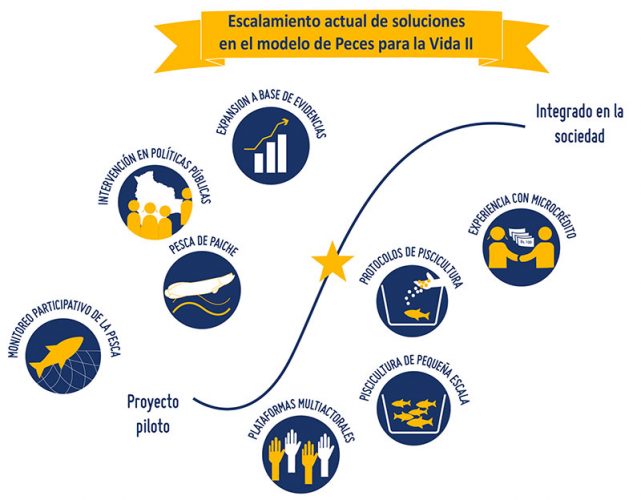Starting from life systems based on fishing and fish farming and their integrated productive complexes, the Fish for Life II Project proposes a group of solutions for the scaling process and strengthening of both productive sectors in Bolivia.
Starting from life systems based on fishing and fish farming and their integrated productive complexes, the Fish for Life II Project proposes a group of solutions for the scaling process and strengthening of both productive sectors in Bolivia.
The Project concentrates its efforts on the following aspects, according to two large scaled models:
- Development of public policies, multi-stakeholder alliances, provision of micro-credits, management of paiche fishing in indigenous communities and access to markets.
- Small-scale family fish farming based on women's leadership, with multi-stakeholder alliances, provision of micro-credits and access to markets.
Fish for Life II develops its activities with an epistemological approach where the generation of rural knowledge is recognized as a creative potential for social action. The methodological approach is based on shared and participatory management, horizontal exchange of knowledge and promotion of knowledge networks and “packaging” of innovations/solutions as models.
A group of proven and adaptable key innovations/solutions have been proposed. The set of strategies proposed by PPVII contribute to influencing public policies, the articulation of public-private actors, production, marketing and knowledge management. In addition, they contribute to the improvement of livelihoods, gender equity and equality, and environmental sustainability. Some examples:
Products: Protocol for research on consumption habits, quality and handling of fish, interactive fish farming manual, protocol for fairs and commercial events.
Services: Financial such as credit, financial leasing, savings and insurance, international exchanges.
Models: Increase in the production of paiche fishing through changes in access rights, increase in the economic value of paiche, good fish handling and hygiene practices, spaces for consultation (platforms), socio-economic model with gender equity , model for providing technical assistance services in fish farming, public investment model.
Policies: Paiche fishing regulations, fish safety/quality regulations, impact on public policies, training of specialized human resources.
A general view of the PPV II scaling process is presented in the figure, on a Rogers Innovation Curve, indicating the estimated state of the different components of the Project at the beginning of the interventions. Furthermore, the approximate status of the overall challenge of sector-based livelihood improvement and better provision of good quality fish for consumers is indicated.
Scaling is a process strongly rooted in the social, which is why quantitative and qualitative indicators are needed. The Project analyzes the nature of the effects in innovative processes, differentiating direct and indirect effects. The direct ones are those caused directly by the solution/innovation and those that receive benefits. Indirect effects are associated with the generation of conditions, scenarios/environments to create changes, which do not necessarily have to do with what was originally sought.

